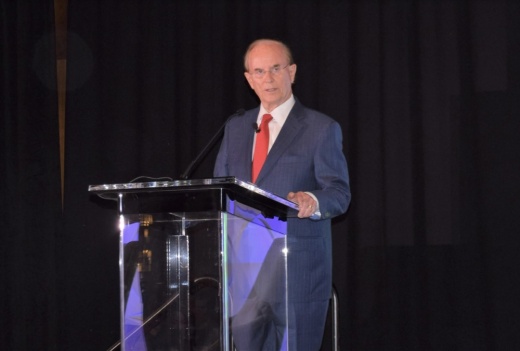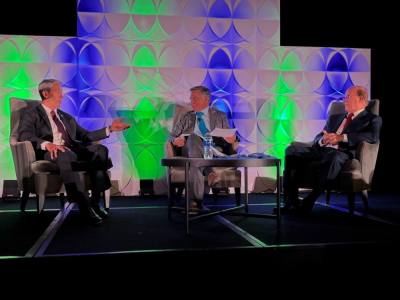Giving his second to last State of the County address on May 18, Bexar County Judge Nelson Wolff hit upon multiple issues, including pandemic recovery, county infrastructure initiatives, electric grid reliability and the San Antonio Spurs’ plans to play four home games away from the AT&T Center.
Wolff spoke to more than 450 North San Antonio Chamber of Commerce luncheon attendees at the Grand Hyatt San Antonio Riverwalk Hotel.
Wolff plans to retire as county judge at year’s end, capping a 51-year career in community service that has included serving as a San Antonio mayor and a state legislator.
Wolff said San Antonio has faced two of its most difficult years with the COVID-19 pandemic’s effects. But as the community recovers, Wolff said residents and businesses are now struggling with inflation and a labor shortage accompanied by an early heat wave that is taxing energy providers.
Wolff said, however, it is important not to give in to a negative mindset.
“Instead of pulling back, we must continue to build for the future. Bexar County is committed to fostering growth by supporting our business community and continuing to invest in capital projects that will enhance economic and job growth,” Wolff said.
Wolff addressed the county commissioners court's 3-1 decision on May 17 to amend the county’s agreement with the Spurs, allowing the team to play two games in Austin, one game in the Alamodome and one game in Mexico in the 2022-23 NBA season.
The move prompted concerns among local leaders and Spurs fans about the franchise’s long-term future in San Antonio. Peter John Holt, Spurs managing partner and the team's largest stockholder, sought to allay some of those worries by issuing a statement, saying the Spurs are here to stay in San Antonio.
Wolff said he believes the Spurs, led by their stockholders, are looking to expand their regional fan base by playing some games outside San Antonio. Wolff thanked commissioners Justin Rodriguez, Rebeca Clay-Flores and Marialyn Barnard for approving the county-Spurs pact. Commissioner Tommy Calvert voted not to amend it.
“The Spurs are us, and we are them, and they will always be part of us,” Wolff said.
Wolff briefly discussed how the statewide power outages during the winter storm of February 2021 re-emphasized the importance of having reliable energy supplies in times of prolonged emergencies and extreme weather.
Wolff said it takes a combination of fossil fuels and renewable energies to produce electricity and keep communities functioning. He thanked local gas and oil companies, such as Valero and NuStar Energy, for their efforts to help bolster energy supplies. But he also said the county is investing in renewables.
“We just ordered 16 electric vehicles, and it will take up to a year to get them, and our lifecycle cost compared to combustion engine [vehicles] is slightly higher,” Wolff said.
Wolff touched upon a number of infrastructure-related measures being undertaken by the county itself or jointly with the city of San Antonio.
According to Wolff, a major phase in the San Pedro Creek redevelopment project is restoration of the creek between Cesar Chavez Boulevard and the north tunnel inlet.
Wolff said the next phase, between South Alamo and Guadalupe streets, is under construction and will connect San Pedro Creek to the San Antonio River. He said the entire creek project should be finished by 2023.
Wolff reminded the crowd about the commissioners court in 2021 adopting a 10-year, $617 million infrastructure program that includes 87 projects.
Wolff said the county is also overseeing 12 flood control projects totaling $110.7 million as well as $244.2 million in creek and trail enhancements.
According to Wolff, Bexar County Engineer Renee Green is overseeing 13 Alamo Regional Mobility Authority projects totaling $196 million.
Wolff also talked about the county’s efforts to lessen residents’ property tax burden. The county recently created a $5,000 homestead exemption. Wolff said the county looks to expand that exemption and apply a slight property tax rate cut.
Additionally, Wolff discussed efforts to shore up public health. He said one lesson learned during the pandemic is that public health should be aligned with hospitals.
“To that end, a few weeks ago, the commissioners court set aside $50 million to assist the creation of an institute of public health and a health equity division within the Bexar County Hospital District,” Wolff said.
Wolff was joined by Mayor Ron Nirenberg in a conversation about various local issues. They also briefly discussed their newly released book, “The Mayor and the Judge: The Inside Story of the War Against COVID,” which chronicles Wolff and Nirenberg’s handling of the local COVID-19 response, from their point of view.
Wolff and Nirenberg said, early in the pandemic, they both felt state and federal leadership was lacking in terms of a comprehensive public health response to the coronavirus outbreak.
Nirenberg said the pandemic further exposed socioeconomic challenges that many residents face.
“So much of our communication in the midst of a crisis is dependent on people having access to services that many in our community go without,” Nirenberg said.
Wolff later told reporters he is scheduled to deliver his final State of the County address at a San Antonio Chamber of Commerce event later this year.
The next Bexar County judge will be chosen in the Nov. 8 general election. Early voting is underway ahead of the May 24 Democratic county judge primary runoff between former District Judge Peter Sakai and District 124 State Rep. Ina Minjarez.
Early voting will end May 20. The Democratic primary winner will face former Precinct 3 County Commissioner Trish DeBerry as the Republican on the ballot in November.






